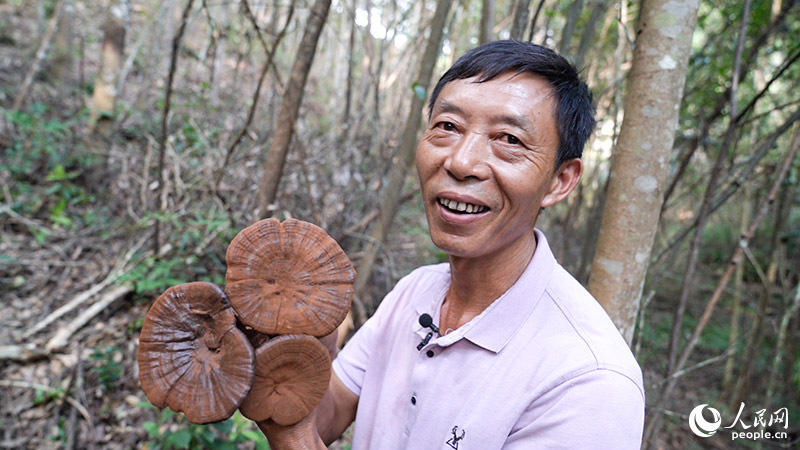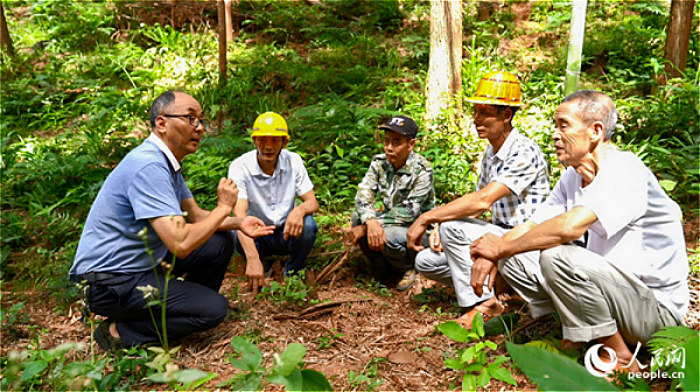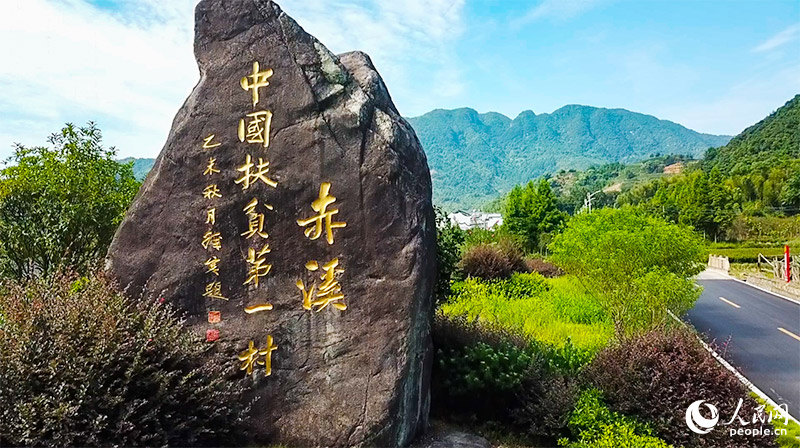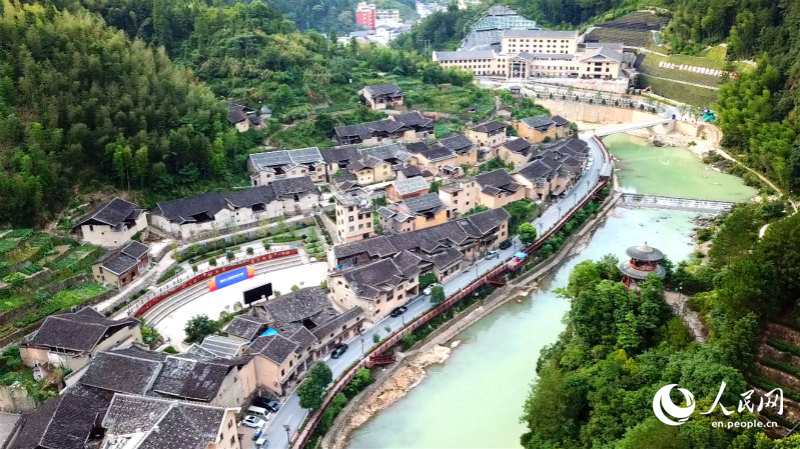

The poverty alleviation campaign in east China's Fujian Province has been reaping dividends, as villagers living deep in the mountains continuously forge ahead in their efforts to revitalise rural areas.
To find out how they’ve achieved this, People’s Daily Online took a special investigative journey to look into the methods the local people are using to make their lives better.
Photo taken on Aug. 8, 2020 shows a bamboo raft drifting along the streams of Jiulixi in Chixi Village, located deep in the mountains of Fujian Province. (Photo: Wang Xian/People's Daily Online)
Under-forest “treasures”
Wuping county, located in the southwestern part of Fujian Province, pioneered reform of the collective ownership system for woodland. After allocating forestry assets to individual families, they soon started seeing the rewards.
Villagers have made full use of the local area’s rich forest resources, making remarkable efforts in developing the under-forest lingzhi mushroom industry. Li Guangjun is one of them.
“The income you get is very satisfying. I used to ride a motorcycle, and now I’m driving my own car. I’ve bought my own house,” Li said. “I wouldn’t have been able to buy these things by being a migrant worker.”

Villagers have made full use of the local area’s rich forest resources, making remarkable efforts in developing the under-forest lingzhi mushroom industry. Li Guangjun is one of them. (Photo: Lan Zhifei/People's Daily Online)
Li used to be a migrant worker before the woodland reform. Back then, the forests were not contracted to villagers and the mountains were poorly developed, as villagers had to live off them by cutting down trees.
After the reform was implemented, under-forest industries such as lingzhi mushroom cultivation and beekeeping began to flourish.
Lingzhi mushrooms have a wide range of edible uses, and have valuable medicinal properties. They can also be used for skincare and beauty products. In 2019, the county fostered 110 new types of under-forest business entities, increasing the average incomes of about 30,000 households by about 50,000 yuan.
Under-forest cultivation of bamboo fungus, nicknamed the “queen of mushrooms”, has boosted the incomes of farmers in Shunchang, another county in Fujian. Gao Yunwang, a technology consultant who has been stationed there for 36 years, has been using his expertise to help local farmers increase their bamboo fungus output.
“I feel the most pride when the farmers learn my techniques, and get a higher income and a higher yield,” Gao said.

Gao Yunwang, a technology consultant who has been stationed in Shunchang County for 36 years, has been using his expertise to help local farmers increase their bamboo fungus output. (Photo: Liu Ning/People's Daily Online)
Xie Wudi, a farmer who grows bamboo fungus, is grateful to Gao for the experience she has gained from him.
“Thanks to Mr. Gao’s innovative technique of moving the cultivation from the field to under the forest, we’ve managed to lower costs because there’s no need for greenhouses,” said Xie with a smile. “I harvested about 160 kilos recently and sold all of it,” she added.
With her income from growing bamboo fungus, Xie is able to send her two kids to school. “In the past, we could barely afford their tuition in college. Now, things are much better with higher yields and greater sales. We can easily afford it,” she said.
“I’m happy when they earn a good living, especially when their bamboo fungus sells for a good price and makes their pockets fuller. It’s all worth it, no matter how hard I work,” Gao said.
Rural tourism and tea plantation create path out of poverty
The residents of Chixi Village, located deep in the mountains of Fujian Province, suffered from extreme poverty 30 years ago. But the village has since been revitalized through the development of industries such as agriculture and rural tourism.
To fully experience the village’s booming rural tourism industry, visitors have to check out the bamboo rafts drifting along the streams of Jiulixi, as well as a high-altitude glass skywalk embedded on the mountain edge that will make anyone’s heart pound faster, even those not afraid of heights.
Last year, Chixi received 270,000 visitors and earned more than 21.6 million yuan in revenue from tourism. The village's per capita net income rose from 166 yuan ($23.70) in 1984 to 22,698 yuan in 2019, and the village's collective income has reached 1.3 million yuan.
Today, Chixi has been dubbed China's No.1 Poverty Relief Village, and set a remarkable example for China's efforts to lift all the poor out of poverty by 2020.

Chixi has been dubbed China's No.1 Poverty Relief Village. (Photo: Wang Xian/People's Daily Online)
About 200 kilometers northwest of Chixi is the mountainous township of Xiadang, which, until the late 1980s, was extremely hard to reach because of poor road infrastructure.
“Life without roads in Xiadang was like being a frog at the bottom of a well, or a bird in a cage. We couldn’t see what was beyond the mountains,” said 72-year-old villager Wang Guangchao in his tea house.
Wang recalled the painstaking efforts involved in carrying large loads of tea leaves to sell. This often meant visiting three different markets, only to find that prices had dropped without warning.
In 1989, Chinese President Xi Jinping, who was then secretary of the Communist Party of China Ningde Prefectural Committee, made his first trip to Xiadang, where he proposed making the building of a sealed road, a hydropower station and office building for the local government a priority.
During the period when Xi was working in Fujian, he visited Xiadang three times to investigate and direct poverty alleviation work.
Now, Xiadang has become easily accessible by road and has cultivated a brand new image, while local residents have a stronger sense of happiness and fulfillment.

Now, Xiadang has become easily accessible by road and has cultivated a brand new image, while local residents have a stronger sense of happiness and fulfillment. Chixi has been dubbed China's No.1 Poverty Relief Village. (Photo: Wang Xian/People's Daily Online)
“President Xi cares about this place. He has always thought about Xiadang. Without his efforts, Xiadang would probably not have seen such a huge change,” Wang said.
The tea plantations that dot the subtropical highlands provide the main source of income for people in Xiadang. Meanwhile, the poverty alleviation campaign has paved the way for sales of local tea to other parts of the country.
“Now, we live fairly well-off lives here,” said Wang Mingxiu, a returning entrepreneur in charge of a tea plantation agriculture cooperative in Xiadang.
“Whatever you do for a living, whether it’s working for other people or picking tea leaves, as long as you work hard and don’t slack off, you can earn yourself a pretty decent living,” Wang added.
The harvest and fulfillment felt by local residents in Fujian are a perfect epitome of the well-earned happiness of Chinese people after so many years of relentless efforts and struggle for more prosperous lives. Their story presents vivid proof of the old adage: “Weak birds take flight early, and constant dropping wears away a stone.”

 Award-winning photos show poverty reduction achievements in NE China's Jilin province
Award-winning photos show poverty reduction achievements in NE China's Jilin province People dance to greet advent of New Year in Ameiqituo Town, Guizhou
People dance to greet advent of New Year in Ameiqituo Town, Guizhou Fire brigade in Shanghai holds group wedding
Fire brigade in Shanghai holds group wedding Tourists enjoy ice sculptures in Datan Town, north China
Tourists enjoy ice sculptures in Datan Town, north China Sunset scenery of Dayan Pagoda in Xi'an
Sunset scenery of Dayan Pagoda in Xi'an Tourists have fun at scenic spot in Nanlong Town, NW China
Tourists have fun at scenic spot in Nanlong Town, NW China Harbin attracts tourists by making best use of ice in winter
Harbin attracts tourists by making best use of ice in winter In pics: FIS Alpine Ski Women's World Cup Slalom
In pics: FIS Alpine Ski Women's World Cup Slalom Black-necked cranes rest at reservoir in Lhunzhub County, Lhasa
Black-necked cranes rest at reservoir in Lhunzhub County, Lhasa China's FAST telescope will be available to foreign scientists in April
China's FAST telescope will be available to foreign scientists in April